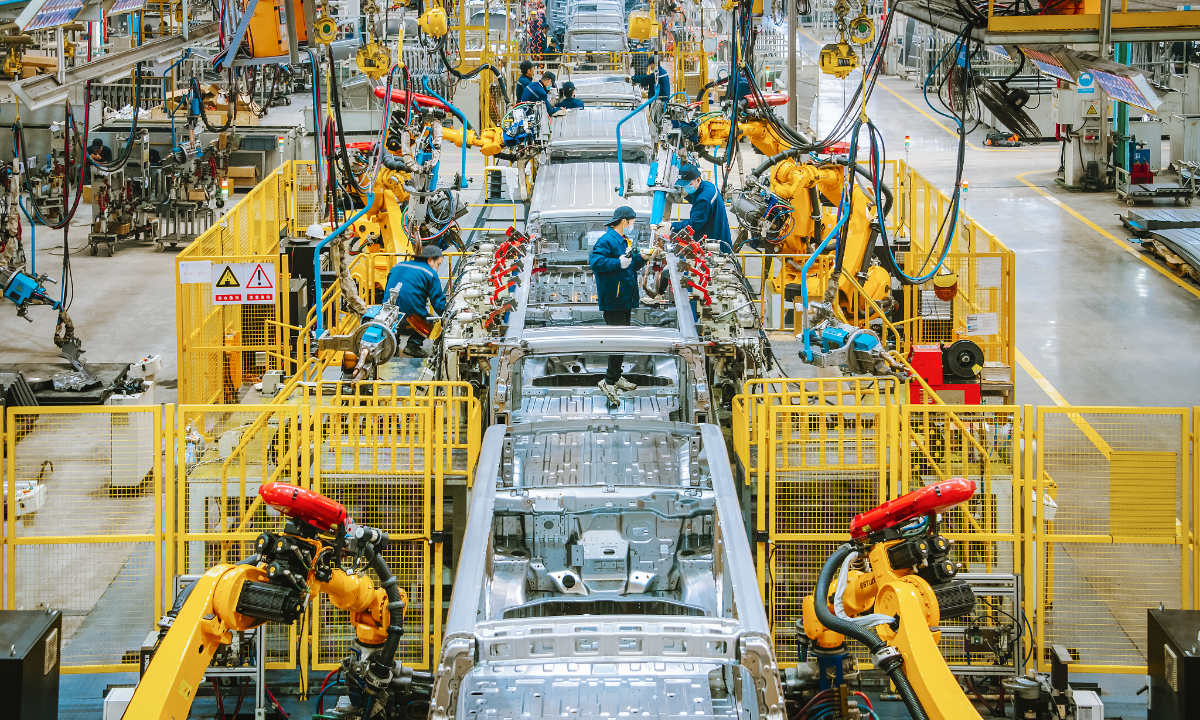
NEV Photo:VCG
The European Commission's (EC) plan to impose tariffs on China-made electric vehicles (EVs) has triggered much opposition from the industry and experts, with Germany's VDA auto association on Wednesday urging the bloc to drop its planned tariffs on Chinese EVs.
Chinese experts also blasted the EU's protectionist practice, noting that the unreasonable decision will not only backfire, but it will also set a bad example by using unilateralism to resolve bilateral trade disputes, which could lead to serious implications for the normal development of global trade.
The German auto association highlighted that the tariffs were hurting European and US carmakers exporting from China and that the risk of retaliation by China with counter-tariffs would hit the German industry hard given its high volume of export to China, Reuters reported.
The value of passenger car exports from Germany to China last year was three times more than the value of imports from China, and the value of exports by component suppliers was four times as much as the value of imports, according to the VDA.
The EC should focus on securing access to critical raw materials many of which are controlled by China for Europe's EV industry, reducing barriers to market access and creating transparency on trade policy, the VDA said, proposing the creation of a council to discuss such matters.
"Anti-subsidy tariffs are not an adequate measure to strengthen European competitiveness and resilience in the long term," the group added.
The EU's tariff policy will lead to a lose-lose situation. Once the tariffs are put into effect, China-made EVs including those manufactured by Tesla and other foreign companies will lose their price advantage. Given that many of China's EVs that have been exported to the EU are produced by the bloc's carmakers, the tariffs could end up hurting the EU, Sun Yanhong, a senior research fellow at the Institute of European Studies of the Chinese Academy of Social Sciences, told the Global Times on Wednesday.
China-Europe auto industry cooperation began 40 years ago, as Germany's Volkswagen took the lead in establishing joint ventures with Chinese companies. Subsequently, France's PSA Peugeot Citroen, Germany's BMW, Daimler and other automakers have come to China.
Over the past 40 years, European car companies have brought advanced technology, management experience and production processes to China, and also embraced high yield in the Chinese market.
By the end of 2022, Volkswagen has delivered around 40 million vehicles in China. Earlier this year in May, BMW Brilliance, a China-Germany joint venture, rolled off its 6 millionth vehicle. Both Volkswagen and BMW account for more than 30 percent of their total global sales in China.
"Compared with China's opening-up, the EU's move indicated the protectionism, which will have an impact on its image of upholding a free international trade order," Sun noted.
Europe has stepped up the promotion of new-energy vehicles to accelerate its pace of carbon neutrality. However, Europe's limited local production capacity requires imports, and tariffs would slow down its green transition, Sun added.
China and the EU on June 22 agreed to launch consultations on the anti-subsidy investigation into Chinese EVs. Sun noted that further negotiations and dialogues between the two sides are needed to find a possible solution.
"It is hoped that a compromise can be found in the coming months if there are honest and full exchanges between the two parties," Sun added.
Yang Chengyu, an associate research fellow at the Institute of European Studies of the Chinese Academy of Social Sciences, said on Wednesday that the unilateral and non-transparent practice of tariffs violates the provisions of the WTO and will seriously affect the normal international economic and trade order.
"Europe has long prided itself on being one of the defenders of multilateralism and trade rules, yet the recent protectionist measures in violation of WTO rules and the unilateralist approach to resolving bilateral trade disputes have actually set a poor example," Yang told the Global Times.
This trend is not conducive to the principle of multilateralism and the harmonization of global trade rules, undermines the authority of international rules and may seriously impact the normal development of global trade in the future, Yang warned.
Despite the EU's increasingly protectionist moves against the Chinese EV sector, the growing trend of collaboration between enterprises of the two sides has not been stopped.
Germany's Volkswagen Group and China's SAIC Motor will further expand their presence in the EV market, with the two carmakers signing several energy technology cooperation agreements on Thursday.
According to the agreements, both sides will jointly develop three plug-in hybrid models and two pure electric models in China, which will be launched as soon as 2026.



